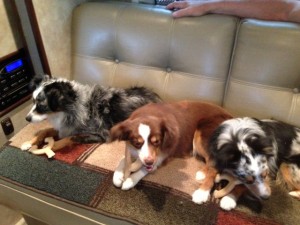Until Swagger was my keeper to use as a stud dog with my girls, I hadn’t had experience with an intact male and the minor issues that arise. Swagger is a superb pet while being a major part of my breeding program so I strive to keep him healthy and happy in order to pass along his best traits to the next generation of pups at Alangus Mini & Toy Aussies.
The only true issue that I have encountered is keeping Swagger at an optimum weight. With the assistance of Dr. Laurelee Rubsch of MVP Vet in Louisville, KY, I have found the perfect combination of food and supplements to keep him feeling his best. Because there are other dogs in the general population that might encounter similar stumbling blocks (both male and female, breeding and non-breeding), Dr. Rubsch’s holistic approach is worth sharing.
Although my dogs are house dogs and live a basically calm life, there are times that they inadvertently reach their stress limit, just as we do. Because of Swagger’s situation with intact girls cycling, he would sometimes be off his food whether it was a time for them to be bred or not. Once he stopped eating, it seemed a bellyache would start a cycle for him and he blamed the food for his belly ache and then to “save” himself, he didn’t want to eat again, a downhill spiral.
Once I pinpointed that Swagger does much better on kibble that does not contain chicken or chicken fat, that was the first step to his feeling like the little man he was meant to be. Once I ruled out foods with chicken, it was even more difficult to find foods that did not have chicken fat because it is a staple in the majority of dog foods. I won’t say that he has an “allergy” to that protein source, but I will say that his stomach flora seems to be much more stable on other proteins. My veterinarian tells me, as does Internet research that this is very common, more common than I had realized.
My next step was reading about irritable bowel syndrome, which can be a disease, but often is a symptom as in Swagger’s case from the cycle I mentioned earlier. That led me to adding Tripett Canned Green Tripe to his daily menu. Tripe is the stomach contents from cud chewing animals and is a natural probiotic. It is not a whole food in itself, but 1/3 can each day gets Swagger off to a good start just like a good breakfast sets us up to perform at our best. I only feed my girls once each day, but Swagger gets his tripe in the morning as an “extra”. The girls love it too and I also give them some occasionally, although not on a regular basis. The canned tripe is available online from www.chewy.com or at some pet supply stores.
Dr. Rubsch advised adding additional probiotics (Probiotic Miracle) to the menu as well as Standard Process Canine Enteric Support powder *1/8 teaspoon of each daily. On my own, I also added Seacure for Pets because it is touted as another all natural supplement with awesome reviews (and I will add my own). These 3 supplements along with the tripe have Swagger in the best condition he has ever been in and full of spunk and vinegar as is the saying around here. Note..these products are available on Amazon.
This regimen may seem extra, but I have seen the difference in the health of my boy. It is probable that once Swagger’s digestive system was stabilized, that the supplements could be discontinued but since they are only food source supplements and not drugs, I see no reason to make changes when it is working and working well! If you find your dog under undue stress for any reason causing a stomach upset or loss of appetite, or they just need a boost to look their fittest, you might consider adding some “yummies” to their diet, but only after your veterinarian has checked them for underlying health problems that need additional treatment.
